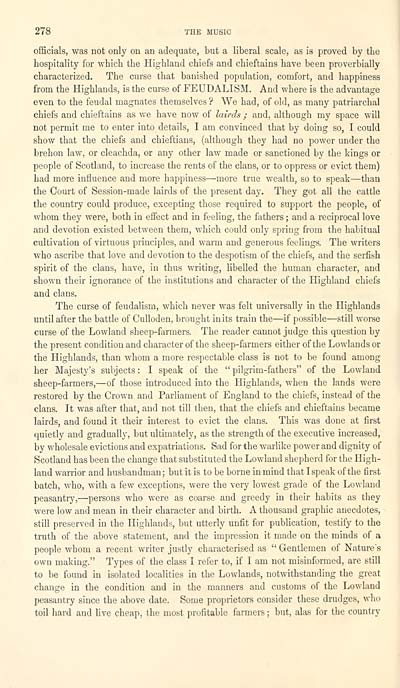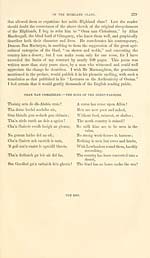Download files
Complete book:
Individual page:
Thumbnail gallery: Grid view | List view

278 THE MUSIC
officials, was not only ou an adequate, but a liberal scale, as is proved by the
hospitality for which the Highland chiefs and chieftains have been proverbially
characterized. The curse that banished population, comfort, and happiness
from the Highlands, is the curse of FEUDALISM. And where is the advantage
even to the feudal magnates themselves ? We had, of old, as many patriarchal
chiefs and chieftains as we have now of lairds ; and, although my space will
not permit me to enter into details, I am convinced that by doing so, I could
show that the chiefs and chieftians, (although they had no power under the
brehon law, or cleachda, or any other law made or sanctioned by the kings or
people of Scotland, to increase the rents of the clans, or to oppress or evict them)
had more influence and more happiness— more true wealth, so to speak — than
the Court of Session-made lairds of the present day. They got all the cattle
the country could produce, excepting those required to support the people, of
whom they were, both in effect and in feeling, the fathers ; and a reciprocal love
and devotion existed between them, which could only spring from the habitual
cultivation of virtuous principles, and warm and generous feelings. The writers
who ascribe that love and devotion to the despotism of the chiefs, and the serfish
spirit of the clans, have, in thus writing, libelled the human character, and
shown their ignorance of the institutions and character of the Highland chiefs
and clans.
The curse of feudalism, which never was felt universally in the Highlands
until after the battle of Culloden, brought in its train the — if possible — still worse
curse of the Lowland sheep-farmers. The reader cannot judge this question by
the present condition and character of the sheep-farmers either of the Lowlands or
the Highlands, than whom a more respectable class is not to be found among
her Majesty's subjects : I speak of the " pilgrim-fathers" of the Lowland
sheep-farmers, — of those introduced into the Highlands, when the lands were
restored by the Crown and Parliament of England to the chiefs, instead of the
clans. It was after that, and not till then, that the chiefs and chieftains became
lairds, and found it their interest to evict the clans. This was done at first
quietly and gradually, but ultimately, as the strength of the executive increased,
by wholesale evictions and expatriations. Sad for the warlike power and dignity of
Scotland has been the change that substituted the Lowland shepherd for the High-
land warrior and husbandman ; but it is to be borne in mind that I speak of the first
batch, who, with a few exceptions, were the very lowest grade of the Lowland
peasantry, — persons who were as coarse and greedy in their habits as they
were low and mean in their character and birth. A thousand graphic anecdotes,
still preserved in the Highlands, but utterly unfit for publication, testify to the
truth of the above statement, and the impression it made on the minds of a
people whom a recent writer justly characterised as " Gentlemen of Nature's
own making." Types of the class I refer to, if I am not misinformed, are still
to be found in isolated localities in the Lowlands, notwithstanding the great
change in the condition and in the manners and customs of the Lowland
peasantry since the above date. Some proprietors consider these drudges, who
toil hard and live cheap, the most profitable farmers ; but, alas for the country
officials, was not only ou an adequate, but a liberal scale, as is proved by the
hospitality for which the Highland chiefs and chieftains have been proverbially
characterized. The curse that banished population, comfort, and happiness
from the Highlands, is the curse of FEUDALISM. And where is the advantage
even to the feudal magnates themselves ? We had, of old, as many patriarchal
chiefs and chieftains as we have now of lairds ; and, although my space will
not permit me to enter into details, I am convinced that by doing so, I could
show that the chiefs and chieftians, (although they had no power under the
brehon law, or cleachda, or any other law made or sanctioned by the kings or
people of Scotland, to increase the rents of the clans, or to oppress or evict them)
had more influence and more happiness— more true wealth, so to speak — than
the Court of Session-made lairds of the present day. They got all the cattle
the country could produce, excepting those required to support the people, of
whom they were, both in effect and in feeling, the fathers ; and a reciprocal love
and devotion existed between them, which could only spring from the habitual
cultivation of virtuous principles, and warm and generous feelings. The writers
who ascribe that love and devotion to the despotism of the chiefs, and the serfish
spirit of the clans, have, in thus writing, libelled the human character, and
shown their ignorance of the institutions and character of the Highland chiefs
and clans.
The curse of feudalism, which never was felt universally in the Highlands
until after the battle of Culloden, brought in its train the — if possible — still worse
curse of the Lowland sheep-farmers. The reader cannot judge this question by
the present condition and character of the sheep-farmers either of the Lowlands or
the Highlands, than whom a more respectable class is not to be found among
her Majesty's subjects : I speak of the " pilgrim-fathers" of the Lowland
sheep-farmers, — of those introduced into the Highlands, when the lands were
restored by the Crown and Parliament of England to the chiefs, instead of the
clans. It was after that, and not till then, that the chiefs and chieftains became
lairds, and found it their interest to evict the clans. This was done at first
quietly and gradually, but ultimately, as the strength of the executive increased,
by wholesale evictions and expatriations. Sad for the warlike power and dignity of
Scotland has been the change that substituted the Lowland shepherd for the High-
land warrior and husbandman ; but it is to be borne in mind that I speak of the first
batch, who, with a few exceptions, were the very lowest grade of the Lowland
peasantry, — persons who were as coarse and greedy in their habits as they
were low and mean in their character and birth. A thousand graphic anecdotes,
still preserved in the Highlands, but utterly unfit for publication, testify to the
truth of the above statement, and the impression it made on the minds of a
people whom a recent writer justly characterised as " Gentlemen of Nature's
own making." Types of the class I refer to, if I am not misinformed, are still
to be found in isolated localities in the Lowlands, notwithstanding the great
change in the condition and in the manners and customs of the Lowland
peasantry since the above date. Some proprietors consider these drudges, who
toil hard and live cheap, the most profitable farmers ; but, alas for the country
Set display mode to: Large image | Transcription
Images and transcriptions on this page, including medium image downloads, may be used under the Creative Commons Attribution 4.0 International Licence unless otherwise stated. ![]()
| Early Gaelic Book Collections > Blair Collection > Treatise on the language, poetry, and music of the Highland clans > (290) |
|---|
| Permanent URL | https://digital.nls.uk/76239593 |
|---|
| Description | A selection of books from a collection of more than 500 titles, mostly on religious and literary topics. Also includes some material dealing with other Celtic languages and societies. Collection created towards the end of the 19th century by Lady Evelyn Stewart Murray. |
|---|
| Description | Selected items from five 'Special and Named Printed Collections'. Includes books in Gaelic and other Celtic languages, works about the Gaels, their languages, literature, culture and history. |
|---|

